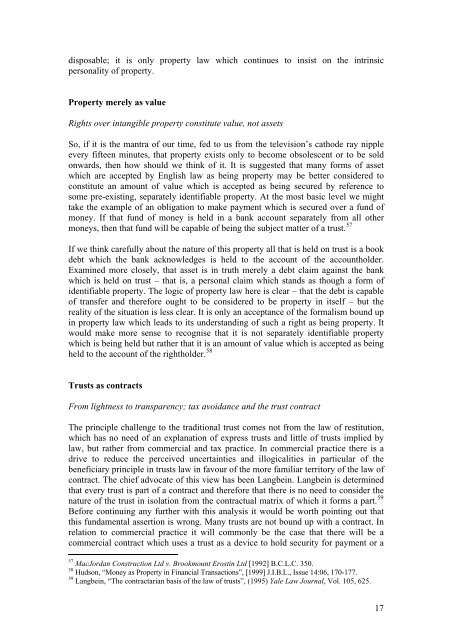The Unbearable Lightness of Property - alastairhudson.com
The Unbearable Lightness of Property - alastairhudson.com
The Unbearable Lightness of Property - alastairhudson.com
Create successful ePaper yourself
Turn your PDF publications into a flip-book with our unique Google optimized e-Paper software.
disposable; it is only property law which continues to insist on the intrinsic<br />
personality <strong>of</strong> property.<br />
<strong>Property</strong> merely as value<br />
Rights over intangible property constitute value, not assets<br />
So, if it is the mantra <strong>of</strong> our time, fed to us from the television’s cathode ray nipple<br />
every fifteen minutes, that property exists only to be<strong>com</strong>e obsolescent or to be sold<br />
onwards, then how should we think <strong>of</strong> it. It is suggested that many forms <strong>of</strong> asset<br />
which are accepted by English law as being property may be better considered to<br />
constitute an amount <strong>of</strong> value which is accepted as being secured by reference to<br />
some pre-existing, separately identifiable property. At the most basic level we might<br />
take the example <strong>of</strong> an obligation to make payment which is secured over a fund <strong>of</strong><br />
money. If that fund <strong>of</strong> money is held in a bank account separately from all other<br />
moneys, then that fund will be capable <strong>of</strong> being the subject matter <strong>of</strong> a trust. 57<br />
If we think carefully about the nature <strong>of</strong> this property all that is held on trust is a book<br />
debt which the bank acknowledges is held to the account <strong>of</strong> the accountholder.<br />
Examined more closely, that asset is in truth merely a debt claim against the bank<br />
which is held on trust – that is, a personal claim which stands as though a form <strong>of</strong><br />
identifiable property. <strong>The</strong> logic <strong>of</strong> property law here is clear – that the debt is capable<br />
<strong>of</strong> transfer and therefore ought to be considered to be property in itself – but the<br />
reality <strong>of</strong> the situation is less clear. It is only an acceptance <strong>of</strong> the formalism bound up<br />
in property law which leads to its understanding <strong>of</strong> such a right as being property. It<br />
would make more sense to recognise that it is not separately identifiable property<br />
which is being held but rather that it is an amount <strong>of</strong> value which is accepted as being<br />
held to the account <strong>of</strong> the rightholder. 58<br />
Trusts as contracts<br />
From lightness to transparency; tax avoidance and the trust contract<br />
<strong>The</strong> principle challenge to the traditional trust <strong>com</strong>es not from the law <strong>of</strong> restitution,<br />
which has no need <strong>of</strong> an explanation <strong>of</strong> express trusts and little <strong>of</strong> trusts implied by<br />
law, but rather from <strong>com</strong>mercial and tax practice. In <strong>com</strong>mercial practice there is a<br />
drive to reduce the perceived uncertainties and illogicalities in particular <strong>of</strong> the<br />
beneficiary principle in trusts law in favour <strong>of</strong> the more familiar territory <strong>of</strong> the law <strong>of</strong><br />
contract. <strong>The</strong> chief advocate <strong>of</strong> this view has been Langbein. Langbein is determined<br />
that every trust is part <strong>of</strong> a contract and therefore that there is no need to consider the<br />
nature <strong>of</strong> the trust in isolation from the contractual matrix <strong>of</strong> which it forms a part. 59<br />
Before continuing any further with this analysis it would be worth pointing out that<br />
this fundamental assertion is wrong. Many trusts are not bound up with a contract. In<br />
relation to <strong>com</strong>mercial practice it will <strong>com</strong>monly be the case that there will be a<br />
<strong>com</strong>mercial contract which uses a trust as a device to hold security for payment or a<br />
57 MacJordan Construction Ltd v. Brookmount Erostin Ltd [1992] B.C.L.C. 350.<br />
58 Hudson, “Money as <strong>Property</strong> in Financial Transactions”, [1999] J.I.B.L., Issue 14:06, 170-177.<br />
59 Langbein, “<strong>The</strong> contractarian basis <strong>of</strong> the law <strong>of</strong> trusts”, (1995) Yale Law Journal, Vol. 105, 625.<br />
17













